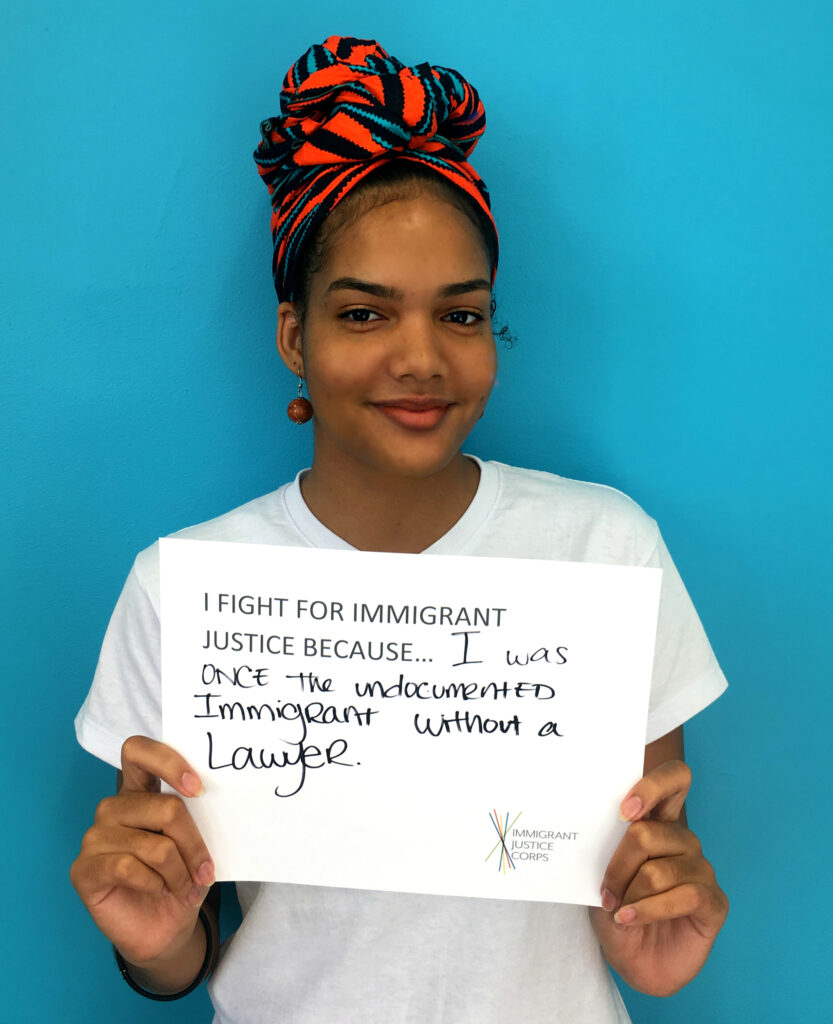Where are they now?: Stephanie Cordero
In the “Where are they now?” series, we introduce you to former IJC Fellows and share their stories — how they became a Fellow and how their Fellowship experience informs their work today.
Stephanie Cordero, a 2014 Justice Fellow, is Director of the Immigrants’ Rights and Advocacy Project at Brooklyn Legal Services. As Director, Stephanie supervises attorneys, ensures the practice meets its deliverables, coordinates intakes, and liaises with other community-based organizations. She also worked for 7 years as a staff attorney at The Legal Aid Society.
Why did you become interested in immigration law?
It was really my personal experiences that drew me to immigration work, which were actually the same reasons why I was not even thinking of doing immigration law when I got into law school. I applied to two clinics in law school, one being the Immigration Justice Clinic and the other one being a labor and employment clinic. Then I spoke with the Immigration Justice Clinic director, who said, ‘You should really do our clinic.’ He kind of poached me. It was the best thing that I did in law school. It really exposed me to the type of work. I thought, ‘I’m an immigrant, obviously I know what the experience is like.’ I almost felt like I wanted distance from it because of my personal experience, but actually doing the work, I saw how exciting and challenging it could be, legally speaking. It brought together my interests, my passion for immigrants’ rights, but also on an intellectual level, it was challenging, and I felt like it was such a great way to use my legal education. There was so much work to be done representing members of my community – the impact would be so large. It was really through the clinic that I understood what immigration law was actually like. It just seemed like such a great opportunity to use the skills I had developed and the ones that I got just from being an immigrant myself to fight for the populations and the communities that I was passionate about giving back to.
Looking back now, what was the most fulfilling part of your Fellowship?
What I really liked was being part of a cohort. I was really inspired by the other Fellows and their stories. I was also really inspired by the Katzmann group – that all of these advocates got together to form this wonderful Fellowship that would really change the game for a lot of immigrants, increase capacity, and provide a space for like minded people to come together. At a different job, you wouldn’t get the same inspiration, the same energy that you get starting with a group of Fellows who are eager to do this work, who are very committed and talented and intelligent and passionate. The most fulfilling thing was to start doing this work with the Fellows and being energized by their commitment and their eagerness to fight for immigrants’ rights.
How do you feel like your experience at the Fellowship informs the work that you do today?
During the Fellowship, you’re intentionally given the opportunity to reflect on the impact, to reflect on why you’re doing the work. I think that makes it so that when you start your career and as you continue doing this work, you stay connected to the mission, because that’s how we started. To me, the job that I do, it’s not just a job. It continues to be something that I’m passionate about and that I feel like I am fulfilling a commitment that I always had. Having the ability to reflect on why it is that we’re doing this work keeps me from burning out. It was instilled early on at the Fellowship, and it’s something that I continue to carry with me.
Not to mention, the huge network of Fellows. We had a little reunion a couple weeks ago, and it was wonderful to see how everyone is still doing immigration work. To be surrounded by that, even to this day, 10 years later, has been really amazing and rewarding to see that that very special group that started was actually very committed. We’re connected for life in a way – the way that we started our careers.
